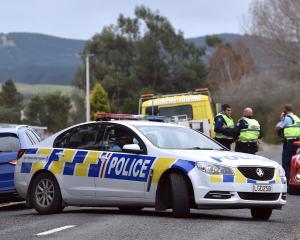Yesterday Transport Minister Gerry Brownlee announced the legal blood-alcohol limit would be lowered from 80 to 50 milligrams per 100 millilitres of blood for drivers aged over 20.
That change had been approved by Cabinet and could be law by early next year.
The announcement follows a two-year review of the impact of lowering the legal blood-alcohol limit by 30mg.
That study estimated an average 3.4 lives would be saved annually and 64 injury crashes avoided, saving $200 million in social costs over a decade.
A request by the Otago Daily Times for a copy of that report was declined by the Ministry of Transport and Mr Brownlee's office.
However, an earlier Ministry of Transport report showed between 2006-10 there were 576 deaths where alcohol was a contributing factor.
High-risk drink-drivers had caused almost two-thirds of fatal crashes where alcohol was found to be a contributing factor.
Of the 576 deaths, 364 (63%) were in crashes caused by a high-risk driver who had either a blood-alcohol level at least 50% over the adult legal limit or a prior alcohol offence.
Mr Brownlee said alcohol impairment was a ''major cause of road accidents in New Zealand'', with an average of 61 fatalities, 244 serious injuries, and 761 minor injuries every year caused by at-fault drivers who had been drinking.
The social cost of these injuries and fatalities was $446 million - ''a huge sum in a country of our size''.
''We know that drivers with a very high blood-alcohol concentration, and recidivist drink-drivers, are responsible for a much higher proportion of alcohol-related road fatalities,'' Mr Brownlee said.
Police data over the past 22 months showed 53 drivers were involved in fatal and serious-injury crashes with blood-alcohol readings between 51 and 80mg per 100ml of blood.
Assistant Commissioner, road policing, Dave Cliff welcomed yesterday's announcement, with police ''to work alongside our road safety partner agencies to support the legislation''.
The New Zealand Transport Agency agency road safety director Ernst Zollner said the change sent a clear message to ''those who would put others at risk by driving drunk''.
''Together with other recent changes including zero-alcohol limits for teens and new penalties for serious and repeat drink-driving offenders, this measure will make New Zealand roads safer for everyone.''
The New Zealand Drug Foundation executive director Ross Bell congratulated the Government's move as ''it shows they are taking road safety seriously''.
Labour's Associate Health spokesman Iain Lees-Galloway, who was behind a member's Bill to lower drink-driving levels, said he would withdraw his Bill and work with the Government ''to make sure this is a robust and enduring change''.
Alcohol Healthwatch director Rebecca Williams said the change would reduce alcohol-related harm on the country's roads, while reducing the pressure on the court system.
At a glance
• Legal blood-alcohol limit to be lowered from 80 to 50mg of alcohol per 100ml of blood for drivers aged over 20.
• While yet to be confirmed, breath-test levels are likely to be lowered from 400mcg per litre of breath to 250mcg, bringing New Zealand in line with Australia.
• Drivers testing positive for this lower limit will receive a $200 fine and gain 50 demerit points
• 100 demerit points for driving-related offences in any two-year period can lead to a three-month suspension of driver's licence.
• Testing positive to more than 80mg of alcohol per 100ml of blood while in charge of a motor vehicle will remain a criminal offence.












